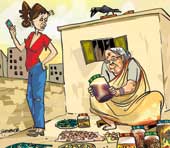 |
Seema Roy, a 27-year old banker in Calcutta, fails to understand why her 60-year-old mother toils with 5 kg of raw mangoes every summer to turn them into pickles. Says Roy, “I see my mother work endlessly for days to get them ready. With so many brands of perfectly decent pickles available in the market, why bother?”
Her mother, Chitra Roy, however, will have none of that. Says she, “I prefer to work for a few days than let my family have those preservative-filled pickles that are available in the market.”
Chitra clearly belongs to what has become a rare breed ? women who still abide by the age old family ritual of making pickles, bori (dried dumplings of lentil) and papad in summer. Even today, they hark back to the time when, come summer, the women of the household ? the mothers, the aunts and the grandmothers ? would gather on the terrace to prepare a year’s stock of pickles and papads. And they try to hold up that tradition, making a few bottles of pickles like mother or grandmother used to make them.
For most other women though, making pickles is a practice that’s as obsolete as cooling your home with khus khus draped over the windows. Ask any young woman, and nine out of 10 will roll their eyes in sheer amusement. Pickles and papad? Bori and achaar? Where, pray, is the time?
Or the space, points out Reena De, 50, a housewife in Calcutta. De remembers her grandmother and aunts making bori and pickles every summer. “My family was based in Midnapore and my grandmother used to make the famous goyna (jewellery-shaped) bori,” says De. “But we lived in a joint family and our house had two terraces which were used to lay out the boris and the pickles. Where do we have that kind of space now,” asks De, who has never made pickles herself.
Tota Roy Choudhury, a resident of Tollygunge, Calcutta, agrees: “Pickles require space, time and effort. Today, we live in small flats and lead hectic lifestyles. Very few of us have the time, the space or the inclination to make pickles.” Roy Choudhury herself continues to make them but she knows that she is the exception rather than the rule here.
Chitra Roy, whose ancestral home was in Burdwan, remembers that pickle making used to be an elaborate affair when she was a child. “All the women of the house got busy in summer, making different kinds of pickles and papads. If the older women were in charge of buying the fruits and vegetables and mixing the spices, the younger girls would watch over the jars that were kept in the sun. It was a collective family exercise and it used to be great fun too, to watch the pickles mature and look forward to the time when we could gorge on the lip-smacking stuff once they were ready.” Pickle making was also considered to be a part and parcel of a woman’s culinary skill, adds Roy.
Today, the younger set may scoff at this laborious and time-consuming tradition, especially when you can get all the pickles you want from any corner shop. But those who do make them still swear by the sheer creative delight it offers them. Says Roy Choudhury, “There is an element of creativity in making pickles. How tasty your pickle is depends on how well you are able to use the different ingredients and blend them with the right spices.” Roy Choudhury makes the usual pickles of mango, lime and green chillies. Chitra Roy too makes pickles with ginger, bitter gourd and garlic, apart from all the usual ones.
Again, that pickle making is no longer a purely family exercise is also evident from the fact that many of those who continue to make it do so for a commercial purpose, albeit on a small scale. For Tota Roy Choudhury, for instance, what started out as a sampling session between colleagues in office slowly gave way to a small enterprise. “My mother was known for her mouth-watering pickles. After she died, my friends encouraged me to carry on with her legacy. That is how I came to make and sell pickles to some known people.' Ditto for Jude Newnes, a cake decorator in Mumbai, who prepares and sells pickles to a select few. According to people like Newnes or Roy Choudhury, what sets their pickles apart is the absence of any artificial preservatives. “My pickles will stay fresh for six months in an unopened packet,” declares Newnes. Little wonder that he is always flooded with requests from friends and acquaintances.
According to Roy Choudhury, good pickles take anywhere between seven and 15 days to mature and they require a lot of patience. Roy Choudhury and others who practise the art even today acknowledge that making pickles at home is a dying tradition. The supermarket shelves hold an array of attractive, hassle-free alternatives. And most young people would rather opt for them.










